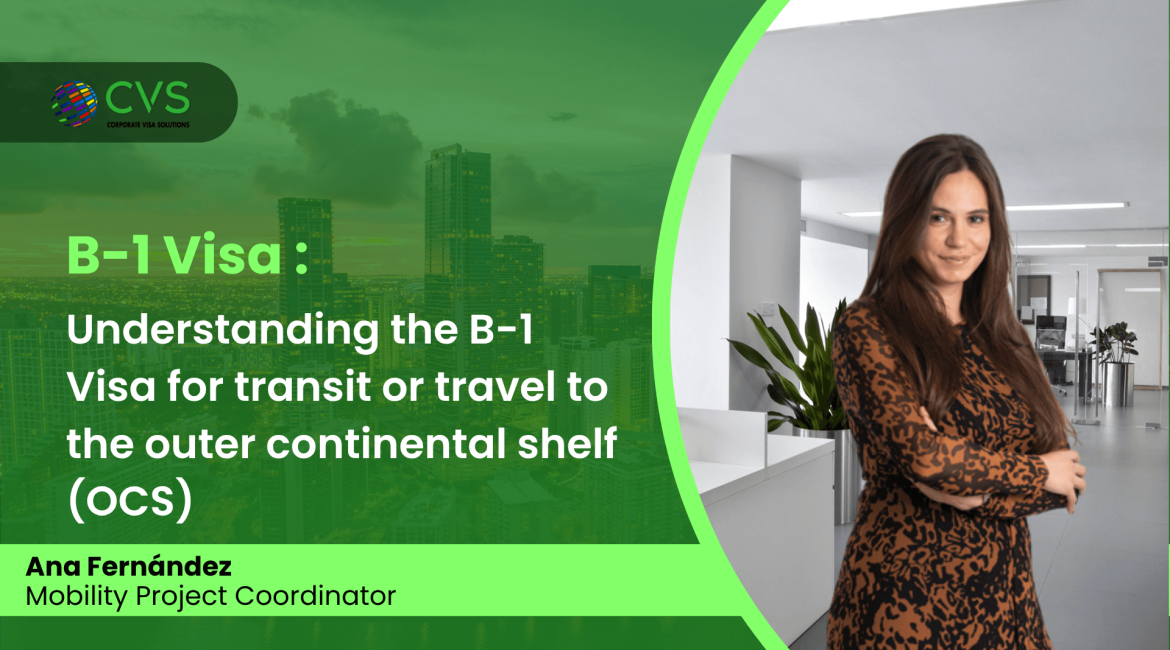As the demand for specialized workers in the offshore oil and gas sector continues to grow, so does the need for a visa solution tailored to these unique job sites. If you are a foreign national seeking to join a rig, platform, or other unit operating on the U.S. Outer Continental Shelf (OCS), the B-1 OCS visa may be your pathway.
In this article, we’ll break down what the B-1 OCS visa is, who qualifies for it, and how to navigate its specific requirements.
What is the B-1 OCS Visa?
The B-1 OCS visa is a subcategory of the standard B-1 Business Visitor visa, designed specifically for individuals traveling to or through the United States to work on units engaged in offshore oil and gas activities on the Outer Continental Shelf.
It is important to note that C-1/D crew visas are not valid for this type of activity, even if the applicant is joining a vessel. Instead, eligible applicants must apply for a B-1 visa with an annotation specific to the OCS.
Who Qualifies?
To qualify for the B-1 OCS visa, the applicant must:
- Be otherwise eligible for a B-1 visa (i.e., no general inadmissibility issues).
- Be traveling to the OCS to join a unit engaged in OCS activity, such as oil or gas exploration or production.
- Present a valid U.S. Coast Guard (USCG) letter demonstrating compliance with manning requirements under the Outer Continental Shelf Lands Act (OCSLA).
What is Considered “OCS Activity”?
According to U.S. Coast Guard regulations (33 CFR 140.10), an OCS activity refers to:
“Any offshore activity associated with the exploration for, or development or production of, the minerals of the [OCS].”
This includes oil and gas operations, but does not include wind farms or other unrelated projects on the OCS.
Importantly, this visa is not applicable to activities unrelated to mineral exploration, such as wind farm operations.
In some cases, technical assignments that don’t fall under OCS activity might better fit under the B-1 industrial worker visa for equipment installation or under the B-1 in lieu of H-1B for certain specialist roles.
Not sure which visa is the best fit for your team? Contact us for tailored guidance.
Manning Requirements and the Role of the USCG
The OCSLA imposes strict citizenship and manning requirements on units operating on the OCS. By default, members of a unit’s “regular complement” (crew, drillers, maintenance, cooks, etc.) must be U.S. citizens or lawful permanent residents (LPRs).
However, a foreign national may be eligible for the B-1 OCS visa if the employer obtains one of the following USCG letters:
- Letter of Exemption (LOE): Certifies that the unit may employ non-U.S. nationals or LPRs in regular complement roles. Valid for 1 year.
- Letter of Non-applicability (LOA): Certifies that the OCSLA manning requirements do not apply to the unit. No expiration date.
- Letter of Determination (LOD): Confirms that the applicant is not part of the regular complement, such as specialists or technicians on temporary duty. Valid for a specified time.
Without one of these letters, consular officers may request an Advisory Opinion from the Department of State.
Application Tips
- Start early: The process to obtain a USCG letter takes time and must be initiated by the employer.
- Work with experienced legal counsel familiar with OCS activity and visa procedures.
- Prepare supporting documentation such as employment contracts, the nature of the unit’s operations, and the USCG letter.
The B-1 OCS visa provides a vital route for international professionals to support U.S. offshore energy operations. Its complexity reflects the unique legal status of the OCS and the U.S. government’s commitment to regulating foreign labor in sensitive maritime environments.
If you’re navigating this process, make sure to consult with immigration experts who understand the nuances of maritime and offshore employment, because in this realm, every detail counts.
Looking to explore more strategic US visa options? Take a look at these related insights:




